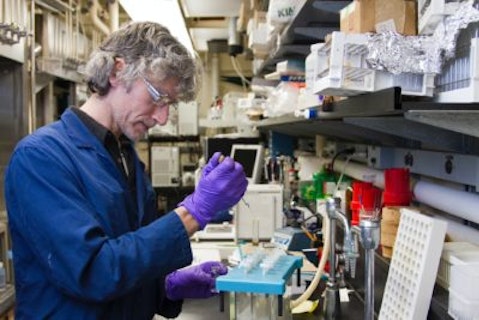In this article, we take a look at the 15 most important medical discoveries in history. You can skip our detailed analysis of the global medicine industry and go directly to the 5 Most Important Medical Discoveries in History.
Medical discoveries have done wonders for civilizations and helped humans to thrive. Since the evolution of modern technology, it has become easier for physicians and medical scientists to research new medicines and vaccines. The demand for medical treatments and medicines continues to rise, considering the increase in different diseases such as HIV, cancer, diabetes, tuberculosis, Alzheimer, and chronic respiratory diseases. In that regard, medical discoveries are more than necessary for humanity and the success of these discoveries is a must.
Global Pandemic Impact
There are many deadly diseases, but a global pandemic can devastate the healthcare sector and to say the least, entire economies. For instance, the COVID-19 pandemic killed millions of people around the world. The lockdowns kept the entire world on hold, affecting the global economy. We are still witnessing the aftershocks of the COVID-19 pandemic as the world gradually recovers. In addition, we have experienced how a pandemic can drive the demand for pharmaceutical firms and medical centers. On January 18, IQVIA Holdings Inc. (NYSE:IQV) shared a report on the global use of medicines in 2023. IQVIA Holdings Inc.’s (NYSE:IQV) report highlights that the COVID-19 pandemic continues to drive pharmaceutical markets, and the global pharmaceutical market is expected to expand by $500 billion from 2020 through 2027. The pharmaceutical industry is mainly influenced by the vaccines being manufactured for COVID-19 patients. The senior vice president and executive director of the IQVIA Institute for Human Data Science, Murray Aitken mentioned that in the coming years, the transition of COVID-19 will enter a new phase, and vaccines and therapeutics will be available but used occasionally.
Global Medicine Market Outlook
As we mentioned earlier, medicine is a fast-growing field worldwide. Countries are working to upgrade their healthcare system and support the sector through huge budget allotments. Some of the most advanced countries in medicine include South Korea, Japan, Denmark, and the U.S.
As per IQVIA Holdings Inc.’s (NYSE:IQV) report, the global demand for medicines will rise sharply in the next five years. The global medicine market is expected to reach $1.9 trillion by 2027. The spending on medicine will grow at a rate of 3-6%, powered by new drug launches and recently launched drugs. Over the past 10 years, the medicine usage in daily doses soared by 36%. However, the report suggests slow growth through 2027, with an estimated daily dose usage of around 3.4 trillion, up by nearly 8% from the 2022 level. The developed economies are continuing to research new products in medicines. The regions expected to have the highest growth and adoption of novel medicines through 2027 include Latin America, Eastern Europe, and parts of Asia.
In addition, the specialty medicine market is estimated to account for 43% of global medicine market spending in 2027. The total spending in developed markets is expected to be around 56%. Cancer remains one of the deadliest diseases worldwide. According to the World Health Organization, cancer accounted for 10 million deaths in 2020. The report from IQVIA Holdings Inc. (NYSE:IQV) has reported global spending on cancer drugs to reach $370 billion by 2027. Whereas, rare diseases such as Alzheimer’s and neurological disorders will speed spending growth in neurology driven by new therapies.
Recent Medical Developments
The advancement in gene-editing is making an impact in the medical world. In recent times, CRISPR has emerged as one of the prolific developments in medical science and through this technology, scientists can alter genetic codes in almost any organism. Moreover, it is a cheaper and more precise technique in gene-editing compared to previous gene-editing methods. However, CRISPR does have drawbacks; for instance, DNA editing cures one mutation at a time. This can cause ever-lasting genetic changes and endure perpetual safety risks. At this point, there is a San Francisco-based biotechnology company, Amber Bio, that is working on RNA using CRISPR technology. Amber Bio is taking the next step in biotech to explore RNA and use CRISPR to potentially rectify a wide range of genetic disorders with minimum safety risks. On August 3, Amber Bio announced that they secured $26 million in seed funding. Playground Global led the seed funding round for the biotech company along with other participants including Hummingbird Ventures, Eli Lilly, and Andreessen Horowitz, among other firms. The investment will help Amber Bio bring top-notch scientists to its development team and continue its research on its RNA editing platform. Amber Bio’s co-founder Jacob Borrajo is motivated to innovate new genetic medicines. Borrajo says, “We want to innovate new genetic medicines that can extend broadly across diverse patient populations without the need to custom tailor to each specific mutation. That’s what gets us at Amber really excited and that’s what we’re building today.”
Scribe Therapeutics is another emerging company that is making notable developments in CRISPR-based genetic medicine. On July 25, Forbes shared that Scribe Therapeutics has potentially secured deals worth $4 billion with big pharmaceutical companies including Sanofi (NASDAQ:SNY) and Biogen Inc. (NASDAQ:BIIB). In 2018, Benjamin Oakes co-founded Scribe Therapeutics along with Jennifer Doudna, Brett Staahl, and David Savage. Scribe is working on the development of specialized CRISPR proteins to fight against various diseases such as amyotrophic lateral sclerosis (ALS), cancer, and sickle cell anemia, among others. In such a short time, the pharmaceutical firm has attracted huge partners and investors.
After Scribe Therapeutics’ initial collaboration with Sanofi (NASDAQ:SNY) in September 2022, Scribe recently signed its second deal with Sanofi. On July 17, Scribe Therapeutics announced its new deal with Sanofi (NASDAQ:SNY), giving an exclusive license to Sanofi (NASDAQ:SNY) for the use of its CRISPR X-Editing (XE) genome editing technologies. With this deal, Sanofi (NASDAQ:SNY) will be able to make developments in vivo therapies such as sickle cell and other genetic diseases. Scribe has secured the deal with an upfront payment of $40 million and will potentially receive over $1.2 billion based on sale milestones.
Biogen Inc. (NASDAQ:BIIB) and Sage Therapeutics, Inc. (NASDAQ:SAGE) are other renowned pharmaceutical firms working on major diseases including postpartum depression (PPD) and major depressive disorder (MDD) among women. Pregnant women are likely to face mental disorders due to PPD during and after pregnancy. According to the Centers for Disease Control and Prevention, 1 in 8 women experience symptoms of PPD in the U.S. On August 4, Biogen Inc. (NASDAQ:BIIB) and Sage Therapeutics, Inc. (NASDAQ:SAGE) received approval and a complete response letter from the U.S. Food and Drug Administration (FDA) for their PPD pill, Zurzuvae. This development is good news for both companies, which can possibly be the solution for millions of people affected by postpartum depression. Following the approval of Zurzuvae, Biogen Inc.’s (NASDAQ:BIIB) CEO Christopher A. Viehbacher made some comments:
“The approval of ZURZUVAE to treat postpartum depression is a major milestone for the hundreds of thousands of women who experience this underdiagnosed and undertreated condition. We appreciate the support of patients, patient advocates and researchers who helped to reach this milestone. We believe that ZURZUVAE will be an important option to treat PPD and we will thoroughly review the feedback from the FDA on the use of zuranolone in MDD to determine next steps.”
After the FDA approval of Zurzuvae, Reuters reported that analysts expect the stocks of both Biogen Inc. (NASDAQ:BIIB) and Sage Therapeutics, Inc. (NASDAQ:SAGE) to fall. Analysts believe that due to a smaller patient population of postpartum depression, there can be a negative sentiment among investors.
However, Biogen Inc. (NASDAQ:BIIB) has posted strong results. On July 25, the company reported earnings for the fiscal second quarter of 2023. The pharmaceutical firm posted revenue of $2.46 billion, beating estimates by $93.2 million. Biogen Inc. (NASDAQ:BIIB) reported earnings per share of $4.02, surpassing consensus by $0.26. During the Q2 2023 earnings call, Biogen Inc. (NASDAQ:BIIB) talked about the approval of Alzheimer’s treatment. The company believes its 100 mg/mL injection, LEQSEBI, is going to have a big impact on the practice of medicine. Here are some of the comments from the earnings call.
“I’d like to start off with LEQSEBI. And I think before we really get into all the interesting details of commercialization and competitiveness, I just like to pause for a moment. This is an historic moment in healthcare history. We’re talking about the very first disease-modifying treatment that’s been approved fully — has received full approval from the FDA and reimbursement from CMS. And there have been literally dozens of medicines that have failed before this drug ever got to market. And that’s important for a couple of reasons, the first is that there is an awful lot we still don’t know. We are really at the beginning of a journey to really understand Alzheimer’s disease and how we can affect this disease.
But it’s also going to have a big impact on the practice of medicine. Physicians haven’t been able to really help patients very much beyond perhaps prescribing Donepezil or products like that. And the treatment that we are proposing here really is going to change an awful lot of how physicians practice and treat these patients. So as we start thinking about intent to prescribe and how physicians are looking at things, we’re actually not going to know that until we actually get out there on the marketplace and see how patients respond. ADUHELM did get approved. But as you all know, it never really got out of the blocks, and never really got launched. So this is really a first. And whenever you’re first, you’re going to discover an awful lot and a lot of this is just not that predictable.
So, I think the launch of the LEQSEBI is off to a very good start and we’ll, of course, keep you up to date as we get further patients. Now, move on to another slide here. One of the things that we’ve been doing an awful lot in the past months is really making sure that we are well-positioned for growth. And as we looked at the company, there’s where we were. As you know, today, we have a relatively mature product profile. Generally, when you have a mature product profile, you would expect the level of investment to go down. But we have actually relatively high operating expenses when we benchmark versus other companies. Part of that is an over-investment in legacy products. But we also have an extremely centralized governance. We’ve got many organizational levels.”

Photo by National Cancer Institute on Unsplash
Biogen Inc. (NASDAQ:BIIB), Sage Therapeutics, Inc. (NASDAQ:SAGE), and Sanofi (NASDAQ:SNY) are among the top medical stocks in the industry, according to hedge funds.
Our Methodology
To find data for the most important medical discoveries in history, we tracked the Nobel Prize winners in medicine. For the most important medical discoveries in history, we adopted a consensus approach. We choose the list of the most impactful Nobel Prize winners in medicine from Medscape, Regis College, and Nobel Prizes That Changed Medicine published by Imperial College Press. We then took the list of the 15 most important medical discoveries in history from each source, the top five, mid-five, and last five from the aforementioned sources, respectively. We took the list in the following pattern to give equal weight to top Nobel Prize winners in medicine, so we can have the most important medical discoveries across different time periods. The latest Nobel Prize winner in medicine is ranked higher. Here is the list of the 15 most important medical discoveries in history.
15 Most Important Medical Discoveries in History
15. Work on Serum Therapy
Year of Medical Discovery: 1901
Nobel Prize Winner: Emil von Behring
In 1901, Emil von Behring got the prestigious Nobel Prize in Physiology or Medicine for his work on diphtheria antitoxin and serum therapy. Behring was the first Nobel Prize winner in medicine and is also known as the father of serum therapy. In 1891, a child suffering from diphtheria received the first successful therapeutic serum treatment. Emil von Behring’s work on serum therapy ranks 15th on our list of the most important medical discoveries in history.
Some of the leading pharmaceutical companies in the world include Biogen Inc. (NASDAQ:BIIB), Sage Therapeutics, Inc. (NASDAQ:SAGE), and Sanofi (NASDAQ:SNY).
14. Work on the Physiology of Digestion
Year of Medical Discovery: 1904
Nobel Prize Winner: Ivan Pavlov
Ivan Pavlov made a breakthrough in the physiology of digestion which allowed him to find conditioned reflexes. In 1904, Pavlov was awarded the Nobel Prize after he successfully defended his work on the physiology of digestion. Ivan Pavlov’s discovery is ranked among the most important medical discoveries in history.
13. Work on the Structure of the Nervous System
Year of Medical Discovery: 1906
Nobel Prize Winner: Camillo Golgi and Santiago Ramón y Cajal
Camillo Golgi and Santiago Ramón y Cajal leaped forward in the discovery of the microscopic structure of the nervous system. In 1906, Golgi and Cajal were awarded the Nobel Prize for their work on the structure of the nervous system, which later helped in many complex physiological studies through technological advancement. Camillo Golgi and Santiago Ramón y Cajal’s work is ranked 13th on our list of the most important medical discoveries in history.
12. Work on the Physiology, Pathology, and Surgery of the Thyroid Gland
Year of Medical Discovery: 1909
Nobel Prize Winner: Emil Theodor Kocher
Emil Theodor Kocher’s work on the physiology, pathology, and surgery of the thyroid gland made a major development in medical science. In 1909, Kocher got the Nobel Prize for his pioneering work on the thyroid gland. By 1917, more than 7,000 thyroid operations took place and nearly three-quarters were done by Kocher. Kocher’s work helped the mortality decrease from 14% in 1884 and 0.18% in 1898. Emil Theodor Kocher’s work is a major development in medical science and is ranked on our list of the most important medical discoveries in history.
11. Discovery of the Mechanism of the Electrocardiogram
Year of Medical Discovery: 1924
Nobel Prize Winner: Willem Einthoven
Willem Einthoven’s discovery of the mechanism of the electrocardiogram, also known as ECG, was a breakthrough in medical history. Einthoven’s work in the field of heart physiology is ranked among the most important medical discoveries in history.
10. Discovery of Penicillin
Year of Medical Discovery: 1945
Nobel Prize Winner: Sir Alexander Fleming, Ernst Boris Chain, and Sir Howard Walter Florey
The discovery of penicillin is considered an evolution in medical science. In 1945, Sir Alexander Fleming, Ernst Boris Chain, and Sir Howard Walter Florey won the Nobel Prize in medicine for discovering penicillin and its therapeutic effect on various infectious diseases. The discovery of penicillin is ranked 10th on our list of the most important medical discoveries in history.
9. Deciphering the Genetic Code
Year of Medical Discovery: 1968
Nobel Prize Winner: Marshall Warren Nirenberg, Har Gobind Khorana, and Robert Holley
In 1968, Marshall Warren Nirenberg, Har Gobind Khorana, and Robert Holley’s work on deciphering the genetic code won the Nobel Prize in medicine. The discovery was based on a ribonucleic acid (RNA) consisting of a single nucleotide which led to a single amino acid. Through this, the scientists solved the first ever genetic code puzzle. Deciphering the genetic code makes our list of the most important medical discoveries in history.
8. Development of Radioimmunoassay
Year of Medical Discovery: 1977
Nobel Prize Winner: Rosalyn Yalow
Rosalyn Yalow became the second woman to win the Nobel Prize in medicine in 1977. Yalow is known for her development of radioimmunoassay (RIA). This discovery introduced a groundbreaking method for the treatment of peptide hormones. Rosalyn Yalow’s development of radioimmunoassay is ranked eighth on our list of the most important medical discoveries in history.
7. Development of Computer Assisted Tomography
Year of Medical Discovery: 1979
Nobel Prize Winner: Allan MacLeod Cormack and Godfrey Hounsfield
Godfrey Hounsfield and Allan MacLeod Cormack contributed to the development of computer assisted tomography (CAT). For their discovery and work on the diagnosis of neurological disorders, Godfrey Hounsfield and Allan MacLeod Cormack were awarded the Nobel Prize in medicine in 1979. Hounsfield and Cormack’s invention is ranked seventh on our list of the most important medical discoveries in history.
6. Work on the Biochemistry and Physiology of Prostaglandins
Year of Medical Discovery: 1982
Nobel Prize Winner: John Robert Vane, Bengt Ingemar Samuelsson, and Sune Bergström
In 1982, John Robert Vane, Bengt Ingemar Samuelsson, and Sune Bergström were awarded the Nobel Prize in medicine for their work on the biochemistry and physiology of prostaglandins. The use of prostaglandins in clinical medicine, particularly in obstetrics and gynecology has been really helpful. The work on the biochemistry and physiology of prostaglandins is ranked among the most important medical discoveries in history.
Pharmaceutical companies that are making major developments in medical science include Biogen Inc. (NASDAQ:BIIB), Sage Therapeutics, Inc. (NASDAQ:SAGE), and Sanofi (NASDAQ:SNY).
Click to continue reading and see the 5 Most Important Medical Discoveries in History.
Suggested Articles:
- Per Capita Cheese Consumption by Country: Top 25
- 20 Countries With The Highest Rates Of Smoking
- Top 30 Countries With The Most Immigrants
Disclosure: none. 15 Most Important Medical Discoveries in History is originally published on Insider Monkey.





